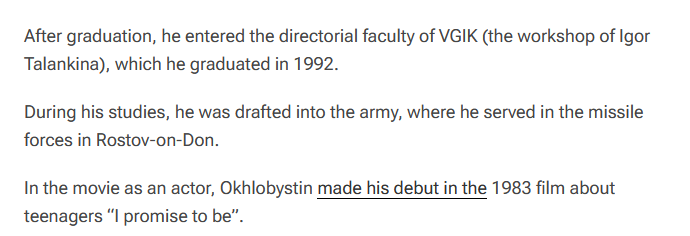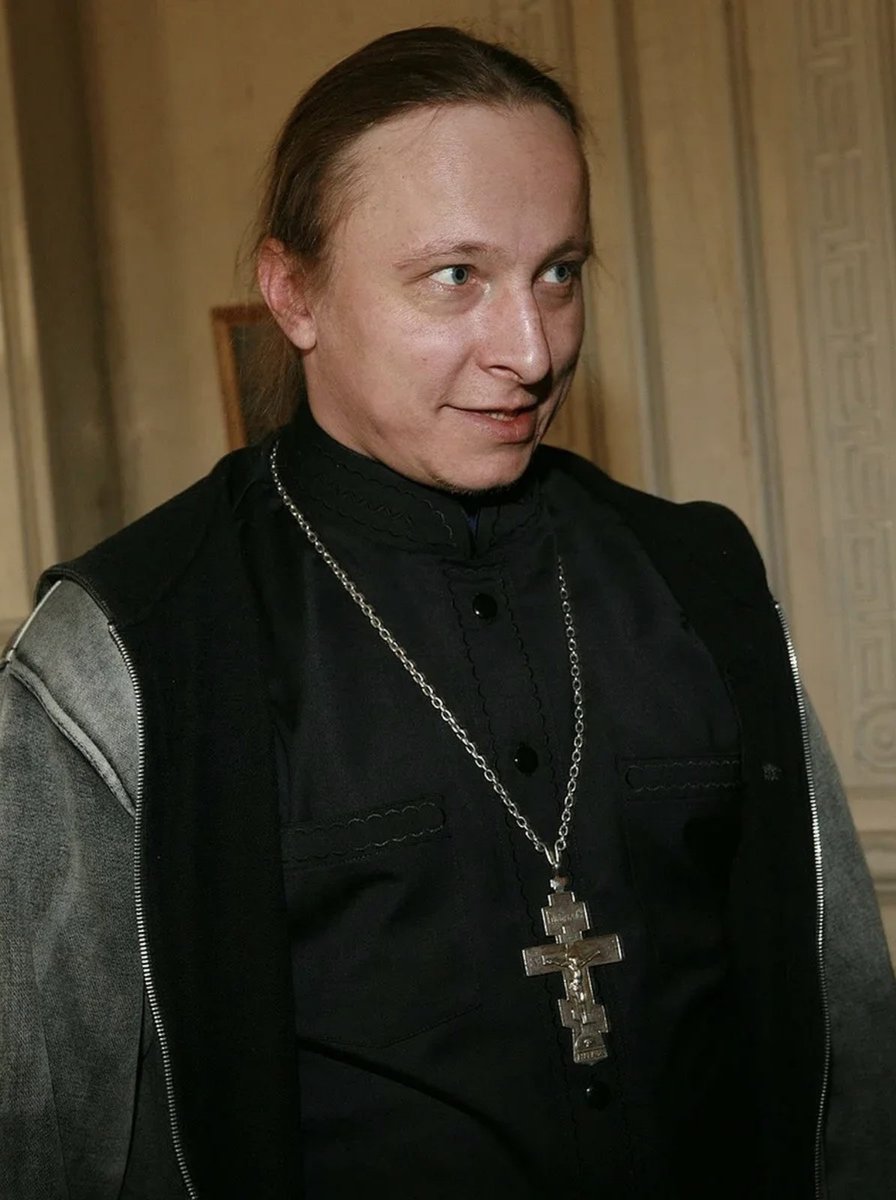In today’s Vatnik Soup, I’ll introduce a Russian movie director, propagandist, and former priest: Ivan Okhlobystin. He’s best known for his strong support for the war on Ukraine and for his radical views, which are often used as a testbed for the domestic Russian audience.
1/20
1/20

Ivan was born in 1966 from a short-lived marriage between a 62-year-old chief physician and a 19-year-old engineering student. She later remarried, and the family moved from Kaluga province to Moscow. Ivan kept the surname Okhlobystin from his biological father.
2/20
2/20

After moving to Moscow, Ivan began studying at VGIK film school. He soon became a playwright for theatre productions and also wrote for Stolitsa magazine, which he later left because, as he put it, “it had become a brothel.”
3/20
3/20

In 2000, he directed Demobbed, a film inspired by his brief stint in the army. Ivan then chose a religious path, becoming a ROC priest. But then something serious must have happened, as in 2010 Patriarch Kirill expelled him, forbidding him from wearing the robe again.
4/20


4/20



Okhlobystin then became one of the main actors in the TV series Interns, best described as a rip-off of the American sitcom House. It gained some popularity and made him a public figure. A little later, he was even named Actor of the Year.
5/20

5/20


In 2011, Ivan turned to politics, announcing a presidential run. His nationalistic, far-right beliefs were radical even by Russia’s nationalistic, far-right political standards. He envisioned a new isolationism with an “Iron Wall” around Russia.
6/20

6/20


When Russia started its war on Ukraine in 2014, Ivan voiced full support. As a result, his events in Ukraine were cancelled, and he was later banned from entering Ukraine altogether. The Donetsk People’s Republic, however, welcomed him, even granting him a passport.
7/20

7/20


In Donetsk, Okhlobystin promoted Novorossiya — the idea of uniting former Tsarist territories in Ukraine. Popularized by Aleksandr Dugin and echoed by Putin, it briefly served as the Kremlin’s main domestic narrative to justify aggression against Ukraine.
8/20

8/20

As is tradition in Russia, Ivan was constantly drunk. In his alcohol-induced delirium, he frantically called friends to declare he would join the war — just after he got some dental work done, so that if he returned wounded, he could still chew his own food.
9/20
9/20

When Russia launched its full-scale invasion of Ukraine in 2022, Okhlobystin quickly went to the Luhansk People’s Republic to donate helmets to Storm-Z troops. During this time, Russian celebrities who didn’t support the war effort were branded traitors.
10/20
10/20

Okhlobystin’s radical rants serve several strategic purposes for the Kremlin: they act as test cases for extreme rhetoric, they help seed future propaganda and, most importantly, they make Putin appear more moderate and reasonable by contrast. A bit like Drunk Dima.
11/20

11/20


For example in 2022, Okhlobystin delivered a menacing speech at a Kremlin-organized propaganda rally in Moscow, calling for a “holy war” against the West. Drawing on his acting background, he appeared to channel Hitler, mimicking his tone, rhetoric, and theatrical gestures.
12/20
12/20
The “holy war” Okhlobystin shrieked for seemed to be testing the waters on behalf of the Kremlin. By Mar 2024, the idea had spread and the Russian Orthodox Church’s Patriarch Kirill officially called the SMO a “holy war” to conquer all of Ukraine.
13/20

13/20


Ivan also urged women to have as many children as possible and compared them to “mycelium”. Stalin and Hitler (Mother’s Cross award for 8 or more children) had made similar appeals and Putin himself reinstated the “Mother Heroine” award in 2022 for women with 10 children.
14/20



14/20



Ivan’s rhetoric resembles that of his fellow over-the-top propagandist Solovyov. The West — referred to as the “Old World” — is full of satanic perverts and crazy Nazi drug addicts. Stirring up hatred is a calculated strategy to prepare the public for war and sacrifices.
15/20
15/20
Okhlobystin also produced a cartoon titled “The ABC of the SMO”, warning soldiers not to get killed. In a Tom & Jerry/Nu, pogodi!-style animation, Russians kill Ukrainians, even featuring a knockoff of The Mask. It’s another effort to normalize the war through pop culture.
16/20
16/20
It’s clear that Okhlobystin is fascist in his views—but there’s also literal proof: photos of him giving the Nazi salute, skull tattoos resembling the SS symbols & outfits disturbingly similar to those worn by the SS officers during the reign of the failed Austrian painter.
17/20

17/20


Like Dugin, Ivan is also extremely homophobic and has a deep hatred towards Ukrainians: He’s called for gays to be “put in ovens” and for genocide of Ukrainians — Nazi traditions. And of course none of that has stopped him for calling Ukrainians nazis.
18/20


18/20



Ivan is also a great example of how in Russia the imperialistic mindset penetrates the whole society — one day you can be a celebrated actor in a House rip-off, and the next you are calling for a “holy war” and the genocide of another country. Comply or die.
19/20
19/20

To conclude, Ivan is a propagandist who tests the limits of public tolerance in Russia — pushing how much obscenity or cruelty can be said before backlash occurs. He serves as both a propaganda testbed and the Kremlin’s canary in the coal mine.
20/20
20/20
The 2nd edition of “Vatnik Soup — The Ultimate Guide to Russian Disinformation” is officially out!
You can order your copy here:
kleart.eu/webshop/p/vatn…
You can order your copy here:
kleart.eu/webshop/p/vatn…
• • •
Missing some Tweet in this thread? You can try to
force a refresh

































